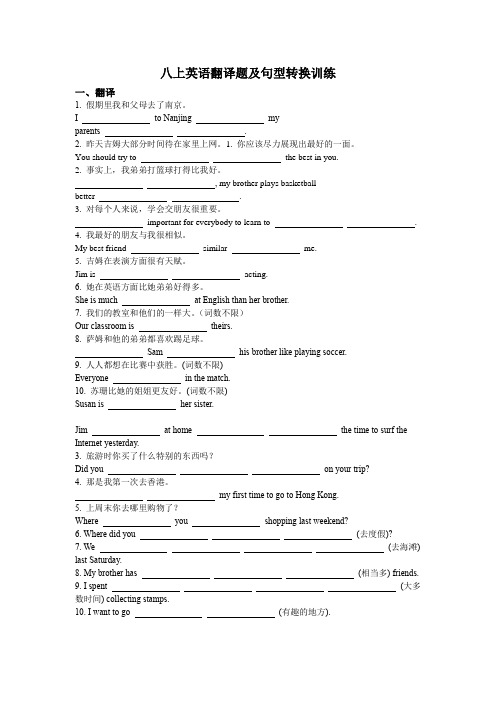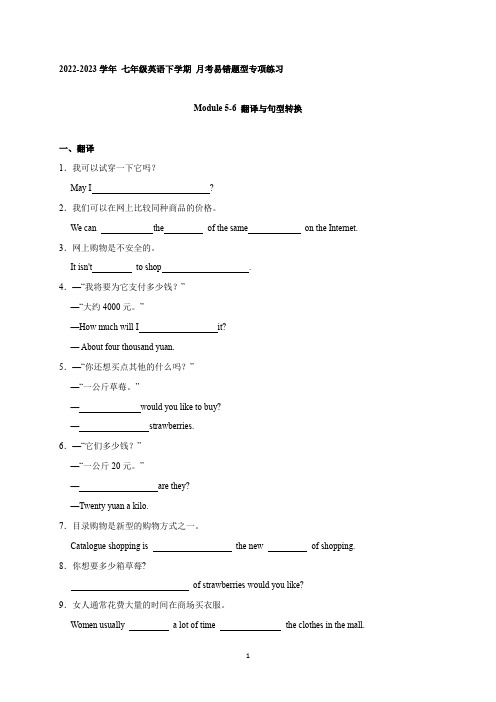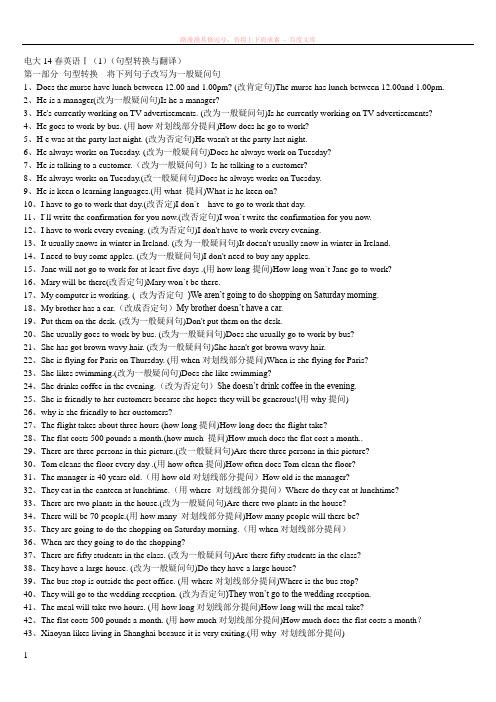翻译与句型转换
Module 1-2 易错题型:翻译与句型转换-八年级英语下学期同步语法应用与实践(外研版)

2022-2023学年八年级英语下学期月考易错题型专项练习Module 1-2 翻译与句型转换一、翻译1.听到这个令人兴奋的消息我很激动。
I'm to hear the news.2.好香的气味!你的比萨饼看起来真好。
a delicious ! Your pizza looks so nice.3.很多孩子每天花费很多时间玩电脑游戏。
Many children a lot of time computer games every day.4.很好,每样吃起来都这么甜!Good, everything so !5.它们尝起来真甜,中间感觉很软。
They taste really sweet and they in the middle.6.你的比萨饼看上去不错。
Your pizza so .7.噢,我的巧克力饼干做好了。
Well, my chocolate cookies .8.谢谢你告诉我关于你的业余爱好的事情。
me about your hobbies.9.托尼为自己感到骄傲,因为他挽救了一个小女孩的生命。
Tony himself because he saved a little girl's life.10.你觉得来中国怎么样?do you to China?11.收到你的来信太好了。
It is great you.12.大明一到家就迫不及待打开电视。
Daming the TV as soon as he got home.13.你确定他将会来美国吗?he will come to America?14.这些蛋糕闻起来很可口。
These cakes.15.妈妈为我感到骄傲。
My mother me.16.收到你的来信真是太好了。
It's great to !17.我迫不及待地要见到你。
I see you.18.我希望你有一天到我的国家访问。
you my country some day. 19.家里没有足够的钱供他上大学。
人教版八上英语翻译题、句型转换专题训练

八上英语翻译题及句型转换训练一、翻译1. 假期里我和父母去了南京。
I to Nanjing myparents .2. 昨天吉姆大部分时间待在家里上网。
1. 你应该尽力展现出最好的一面。
You should try to the best in you.2. 事实上,我弟弟打篮球打得比我好。
, my brother plays basketballbetter .3. 对每个人来说,学会交朋友很重要。
important for everybody to learn to .4. 我最好的朋友与我很相似。
My best friend similar me.5. 吉姆在表演方面很有天赋。
Jim is acting.6. 她在英语方面比她弟弟好得多。
She is much at English than her brother.7. 我们的教室和他们的一样大。
(词数不限)Our classroom is theirs.8. 萨姆和他的弟弟都喜欢踢足球。
Sam his brother like playing soccer.9. 人人都想在比赛中获胜。
(词数不限)Everyone in the match.10. 苏珊比她的姐姐更友好。
(词数不限)Susan is her sister.Jim at home the time to surf the Internet yesterday.3. 旅游时你买了什么特别的东西吗?Did you on your trip?4. 那是我第一次去香港。
my first time to go to Hong Kong.5. 上周末你去哪里购物了?Where you shopping last weekend?6. Where did you (去度假)?7. We (去海滩) last Saturday.8. My brother has (相当多) friends.9. I spent (大多数时间) collecting stamps.10. I want to go (有趣的地方).36. --- 他们多久去看一次电影? --- 通常每月看一次电影。
Module 5-6 易错题型:翻译与句型转换-2022-2023学年七年级英语下学期

2022-2023学年七年级英语下学期月考易错题型专项练习Module 5-6 翻译与句型转换一、翻译1.我可以试穿一下它吗?May I?2.我们可以在网上比较同种商品的价格。
We can the of the same on the Internet. 3.网上购物是不安全的。
It isn't to shop.4.—“我将要为它支付多少钱?”—“大约4000元。
”—How much will I it?— About four thousand yuan.5.—“你还想买点其他的什么吗?”—“一公斤草莓。
”—would you like to buy?—strawberries.6.—“它们多少钱?”—“一公斤20元。
”—are they?—Twenty yuan a kilo.7.目录购物是新型的购物方式之一。
Catalogue shopping is the new of shopping. 8.你想要多少箱草莓?of strawberries would you like?9.女人通常花费大量的时间在商场买衣服。
Women usually a lot of time the clothes in the mall.10.露西, 你还想要其他什么东西?would you like, Lucy?11.买这些衣服你如何付钱?How do you the clothes?12.我们可以在网上买所有东西。
We can buy everything .13.香蕉多少钱?are the bananas?14.今天苹果半价销售。
The apples are today.15.他们喜欢什么颜色?do they like?16.过马路时要小心。
Be careful when you the street.17.I get there?我怎样到那里呢?18. a bookshop near here?这儿附近有书店吗?19.劳驾,请问到博物馆怎么走?Excuse me.Could you tell me to the museum?20.游客可以乘地铁到奥林匹克运动中心。
电大14春英语句型转换与翻译 (1)

电大14春英语Ⅰ(1)(句型转换与翻译)第一部分句型转换将下列句子改写为一般疑问句1、Does the murse have lunch between 12.00 and 1.00pm? (改肯定句)The murse has lunch between 12.00and 1.00pm.2、He is a manager(改为一般疑问句)Is he a manager?3、He's currently working on TV advertisements. (改为一般疑问句)Is he currently working on TV advertisements?4、He goes to work by bus. (用how对划线部分提问)How does he go to work?5、H e was at the party last night. (改为否定句)He wasn't at the party last night.6、He always works on Tuesday. (改为一般疑问句)Does he always work on Tuesday?7、He is talking to a customer.(改为一般疑问句)Is he talking to a customer?8、He always works on Tuesday.(改一般疑问句)Does he always works on Tuesday.9、He is keen o learning languages.(用what 提问)What is he keen on?10、I have to go to work that day.(改否定)I don`t have to go to work that day.11、I`ll write the confirmation for you now.(改否定句)I won`t write the confirmation for you now.12、I have to work every evening. (改为否定句)I don't have to work every evening.13、It usually snows in winter in Ireland. (改为一般疑问句)It doesn't usually snow in winter in Ireland.14、I need to buy some apples. (改为一般疑问句)I don't need to buy any apples.15、Jane will not go to work for at least five days .(用how long提问)How long won`t Jane go to work?16、Mary will be there(改否定句)Mary won`t be there.17、My computer is working. ( 改为否定句)We aren’t going to do shopping on Saturday morning.18、My brother has a car.(改成否定句)My brother doesn’t have a car.19、Put them on the desk. (改为一般疑问句)Don't put them on the desk.20、She usually goes to work by bus. (改为一般疑问句)Does she usually go to work by bus?21、She has got brown wavy hair. (改为一般疑问句)She hasn't got brown wavy hair.22、She is flying for Paris on Thursday. (用when对划线部分提问)When is she flying for Paris?23、She likes swimming.(改为一般疑问句)Does she like swimming?24、She drinks coffee in the evening.(改为否定句)She doesn’t drink coffee in the evening.25、She is friendly to her customers becarse she hopes they will be generous!(用why提问)26、why is she friendly to her oustomers?27、The flight takes about three hours (how long提问)How long does the flight take?28、The flat costs 500 pounds a month.(how much 提问)How much does the flat cost a month..29、There are three persons in this picture.(改一般疑问句)Are there three persons in this picture?30、Tom cleans the floor every day .(用how often提问)How often does Tom clean the floor?31、The manager is 40 years old.(用how old对划线部分提问)How old is the manager?32、They eat in the canteen at lunchtime.(用where 对划线部分提问)Where do they eat at lunchtime?33、There are two plants in the house.(改为一般疑问句)Are there two plants in the house?34、There will be 70 people.(用how many 对划线部分提问)How many people will there be?35、They are going to do the shopping on Saturday morning.(用when对划线部分提问)36、When are they going to do the shopping?37、There are fifty students in the class. (改为一般疑问句)Are there fifty students in the class?38、They have a large house. (改为一般疑问句)Do they have a large house?39、The bus stop is outside the post office. (用where对划线部分提问)Where is the bus stop?40、They will go to the wedding reception. (改为否定句)They won’t go to the wedd ing reception.41、The meal will take two hours. (用how long对划线部分提问)How long will the meal take?42、The flat costs 500 pounds a month. (用how much对划线部分提问)How much does the flat costs a month?43、Xiaoyan likes living in Shanghai because it is very exiting.(用why 对划线部分提问)44、Why does Xiaoyan like living in Shanghai?45、You can smoke in the bedrooms. (改为一般疑问句)You can’t smoke in the bedroom.46、You can`t smoke here.(改祈使句)(Please)Do not smoke here.47、You can use the phone in the living room .(改否定句)You can`t use the phone in the living room .48、You get off in front of the swimming pool.(用where提问)where do you get off?第二部分翻译1、Could you open that bottle, please?请你打开那个瓶子好吗?2、David usually has a sandwich in his office at lunchtime.通常大卫的午餐是在办公室吃个三明治。
单项练习翻译句子、句型转换

英语单项练习(3)————句型转换、翻译句子A 根据汉语提示,用句末括号内所给的英语单词完成句子。
1. 我不会去参加这个聚会,除非受到邀请。
I won’t go to the party . (invite) 2. 请告诉我事故是什么时候发生的好吗?Could you tell me ? (happen )3. 为什么不让孩子去他们想去的地方呢?the children go where they want? (why) 4. 我不知道明天他会不会准时参加会议。
he'll come to the mee ng on me tomorrow. (wonder) 5. 他和我都不喜欢唱歌跳舞。
他和我都不喜欢唱歌跳舞。
he I interested in singing and dancing. (be) B 根据所给汉语和句子意思,用英语补全句子。
6. 我的爷爷习惯早起。
我的爷爷习惯早起。
My grandma’s ________ ________ ge ng up early.7. 过度使用手机对身体有害。
过度使用手机对身体有害。
Using mobile phones _______ ________ is bad for your health. 8. 今天我以学校为荣,明天学校以我为傲。
Today I’m ________ of my school and tomorrow my school will take ______ in my success. 9. 如果时间再多一点,我将能做的更好。
If more me _______ ______, I will do it be er. 10. 即使是最简单的日常活动也会对环境造成影响。
Even the simplest ________ ________ can make a difference to the environment. 11. — How can I speak English ________(与你一样好), Rose? — Prac ce makes perfect. 12. The charity aims to provide help to people ________(需要).13. Peter was so red that he ________(直到……才醒来) half past eight yesterday. 14. — Simon has difficult in ________(与……相处得好) his new classmates.xK b1 .C om — I'll give him some advice. 15. 15. A A A recent recent recent survey survey survey shows shows shows more more more than than than two two -thirds thirds of of of Chinese Chinese Chinese ________(________(对……满意) ) their their their health health service. 16.我相信我们的中国梦一定会实现。
Units 5-6 易错题型:翻译与句型转换-2022-2023学年七年级英语下学期

2022-2023学年七年级英语下学期月考易错题型专项练习Unit 5-6 翻译与句型转换一、句型转换1.根据括号内的要求完成下列各题,每空一词(含缩略形式)。
(1)His family has a white dog.(改为一般疑问句)his family a white dog?(2)Lily can dance well.(改为否定句)Lily well.(3)Mr.Brown is from England.(改为同义句)Mr.Brown England.(4)My Brother ddesn't like soccer because it's boring.(对划线部分提问)your brother like soccer?(5)These boys live in Shanghai.(对划线部分提问)these boys?2.按照要求改写句子(1)Mo Yan, the great writer, is from Shandong. (对画线部分提问)Mo Yan,the great writer, ?(2)My mother likes dogs because they're smart.(对画线部分提问)mother dogs?(3)Why do you like tigers?(改为否定句)like tigers?(4)Li Ming is from China.(改为同义句)Li Ming China.(5)The dog can walk on two legs.(对画线部分提问)the dog ?3.按照要求完成句子改写。
(1)Mary likes penguins because they're cute.(对画线部分提问)(2)Lions come from Africa.(对画线部分提问)(3)Koalas are a little shy.(改为同义句)(4)Tony likes giraffes.(对画线部分提问)(5)Nancy likes to eat fish.(改为一般疑问句)4.根据括号内的要求完成下列各题,每空一词(含缩略形式)。
句型转换、翻译句子练习题

句型转换、翻译句子练习题句型转换、翻译句子一、句型转换涉及的动词分类:1. 情态动词:can may would will should could…2. be动词:am is are (过去式:was were)3. 助动词:do does did二、句子分类:①有情有be(句子中有情态动词或者有be动词)②无情无be(句子中既没有情态动词也没有be动词)三、有情有be类型:A. 肯定句变否定句1. This is my book. ----- This is not my book. is not = isn’t are not = aren’t2. I can sing a song. ----- I can not sing a song. can not= can’t总结口诀:有情有be变否定,情be后加not。
B. 肯定句变疑问句1. This is my book. -----Is this your book?2. I can sing a song. -----Can you sing a song?总结口诀:有情有be变疑问,情be提至句首并大写,一二人称转换,句末句号改问号。
四、无情无be类型:A. 肯定句变否定句I like to fly a kite. ----- I don't like to fly a kite.do not = don’t does not = doesn’tShe went to the cinema last night. ----- She didn’t go to the cinema last night. did not = didn’t总结口诀:无情无be变否定,借助do, does, did,do, does, did 后加not, 后面动词现原形。
B. 肯定句变疑问句I like to fly a kite.----- Do you like to fly a kite?She went to the cinema last night. ----- Did she go to the cinema last night?总结口诀:无情无be变疑问,借助do, does, did,do, does, did 提至句首并大写,一二人称转换,后面动词现原形,句末句号改问号。
常用十大英汉互译翻译技巧

常用十大翻译技巧英汉两种语言在句法、词汇、修辞等方面均存在着很大的差异,因此在进行英汉互译时必然会遇到很多困难,需要有一定的翻译技巧作指导。
常用的翻译技巧有增译法、省译法、转换法、拆句法、合并法、正译法、反译法、倒置法、包孕法、插入法、重组法和综合法等。
1、增译法:指根据英汉两种语言不同的思维方式、语言习惯和表达方式,在翻译时增添一些词、短句或句子,以便更准确地表达出原文所包含的意义。
这种方式多半用在汉译英里。
汉语无主句较多,而英语句子一般都要有主语,所以在翻译汉语无主句的时候,除了少数可用英语无主句、被动语态或"There be?结构来翻译以外,一般都要根据语境补出主语,使句子完整。
英汉两种语言在名词、代词、连词、介词和冠词的使用方法上也存在很大差别。
英语中代词使用频率较高,凡说到人的器官和归某人所有的或与某人有关的事物时,必须在前面加上物主代词。
因此,在汉译英时需要增补物主代词,而在英译汉时又需要根据情况适当地删减。
英语词与词、词组与词组以及句子与句子的逻辑关系一般用连词来表示,而汉语则往往通过上下文和语序来表示这种关系。
因此,在汉译英时常常需要增补连词。
英语句子离不开介词和冠词。
另外,在汉译英时还要注意增补一些原文中暗含而没有明言的词语和一些概括性、注释性的词语,以确保译文意思的完整。
总之,通过增译,一是保证译文语法结构的完整,二是保证译文意思的明确。
如:(1)What about calling him right away? 马上给他打个电话,你觉得如何?(增译主语和谓语)(2)If only I could see the realization of the four modernizations.要是我能看到四个现代化实现该有多好啊!(增译主句)(3)Indeed, the reverse is true 实际情况恰好相反。
(增译名词)(4)就是法西斯国家本国的人民也被剥夺了人权。
- 1、下载文档前请自行甄别文档内容的完整性,平台不提供额外的编辑、内容补充、找答案等附加服务。
- 2、"仅部分预览"的文档,不可在线预览部分如存在完整性等问题,可反馈申请退款(可完整预览的文档不适用该条件!)。
- 3、如文档侵犯您的权益,请联系客服反馈,我们会尽快为您处理(人工客服工作时间:9:00-18:30)。
第三部分:句型变换1.Tim didn’t stay in the meeting. He left the office.( 用instead of将两句连成一句)答案: Tim left the office instead of staying in the meeting.Tim didn’t go to work the next day. He cleared up the flat.(用instead of将两句合成一句。
) 答案: He cleared up the flat instead of going to work the next day.Although it rained, the visit was a success. (用instead of将两句连成一句)答案: The visit was a success in spite of the rain.Mary didn’t stay at home. She went round to see Tim.(用instead of将两个句子合成一句。
) 答案: Instead of staying at home, Mary went round to see Tim.2.Where is the restaurant? (用 he asked改写成间接特殊疑问句)答案:he asked where the restaurant was.3.That cinema is very nice. The tickets are quite expensive. (用but将量具连成一句)答案:That cinema is very nice but the tickets are quite expensive,I was too hot. I couldn’t open the window. (用but将两句合成一句)答案: I was too hot but I couldn’t open the window.I cooked dinner. Nobody ate it (用but将两句合成一句)答案: I cooked dinner but nobody ate it.It was too hot. I corldn’t open the window.(用but将两句连成一句)答案:It was too hot,but I couldn’t open the window.4.He’s gone to Shanghaii. He negotiating a new contract. (用动词不定式将两句连成一句)答案:he’s gone to shanghai to negotiate a new contract.They are saving money. They’re planning a holiday. (用动词不定式将两句连成一句)答案:They are saving money to plan a holiday.She’s looking for somebody. She wants somebody to help her.(用动词不定式将两句连成一句)答案:She’s looking for somebody to help her.She’s coming here. she’s signing the contract.(用动词不定式将两句连成一句)答案:She’s coming here to sign the contract.5. He didn’t run fast. He didn’t catch the bus. ( 用enough…to 将两句连成一句)答案:he didn’t run fast enough to catch the bus.6.I went shopping. I needed a new a pair of shoe. ( 用because将两句连成一句。
)答案:I went shopping because I needed a new pair of shoes.7.“Can you phone me later, Susan?” said David. (用ask, to改写句子)答案:David asked me if I could phone him later.8.I’m a teacher and she is also a teacher .(用so改写句子)答案:I’m a teacher, so is she.I’m tall and thin. My mother is too. (用 so将两句合成一句)答案: I’m tall and thin, so is my mother.It was raining. We went home. (用so将两句合成一句)答案:It was raining so we went home.Tim has lost his camera. I have lost my camera.( 用 so将两句合成一句。
)答案: Tim has lost his camera and so have I.9.She forgot about the meeting yesterday. (用what 针对the meeting改写句子。
)答案:They are going to look after the cat. (.用what 针对the cat改写句子)答案Jack is responsible for all the meeting.(用what 针对all the meeting提问。
)答案:They are worried about Jim.(用Who钍对Jim提问)答案:Who are they worried about?10.His neighbor heard them. They made a noise. (用动词ing形式改写句子)答案: His neighbor heard them making a noise.His neighbor listen to them, They damaged the flat.(用动词ing形式将两个句子合成一句。
) 答案:His neighbor listened to them damaging the flat.I can’t keep accounts. She can’t keep accounts. (用neither改写句子。
)答案:I can’t keep accounts and neither can she.11.He stole the laptop.(改为被动语态)答案: The laptop was stolen by him.they carried the things to the van.( 改为被动语态)答案:the things were carried to the van by them.They smashed the window.( 改为被动语态)答案:The window was smashed by them.The neighbor contacted the police.( 改为被动语态)答案:The police were contacted by the neighbor.He disturbed the burglars. .( 改为被动语态)答案:The burglars were disturbed by him.He disturbed the burglars.( 用被动语态改写句子)答案: The burglars were disturbed by him.12.“ I can’t find my notebook.” She said .(改为间接引语。
)答案: She said she couldn’t find her notebook.“Have you got my bag?” She asked.( 将句子改成间接引语。
)答案: She asked if I had her bag.13.It was a place. He wanted to go there. (用where 将两句合成一句。
)答案: It was a place where he wanted to go.14.we had a picnic. It rained. (用although将两句连成一句)答案: We had a picnic although it rained.I missed the train, I arrived at work on time. (用although将两句连成一句)答案: Although I missed the train, I arrived at work on time.15.I beat Jane at tennis. She was so tired. (用because将两句连成一句。
)答案: I beat Jane at tennis because she was so tired.I went shopping.I needed a new pair of shoes.(用because将两句连成一句)答案:I went shopping because I needed a new pair of shoes.16.I went to Manchester. ( 用where针对 Manchester提问。
)答案:Where did you go?17.I went to a party last week. (用when针对last week提问。
)答案:When did you go to a party?18.Tim helped Xiaoyan with cooking.( 用who针对Tim 提问。
)答案:Who helped XiaoYan with cooking?They are worried about Jim. (用who针对Jim提问。
)答案:Who are they worried about?19.Although it rained,the visit was a success.(用In spite of将两句连成一句)答案:The visit was a success in spite of rain.翻译:英译汉1. I didn’t get up until 11.30 this morning.答案:我今天上午十一点半才起床。
